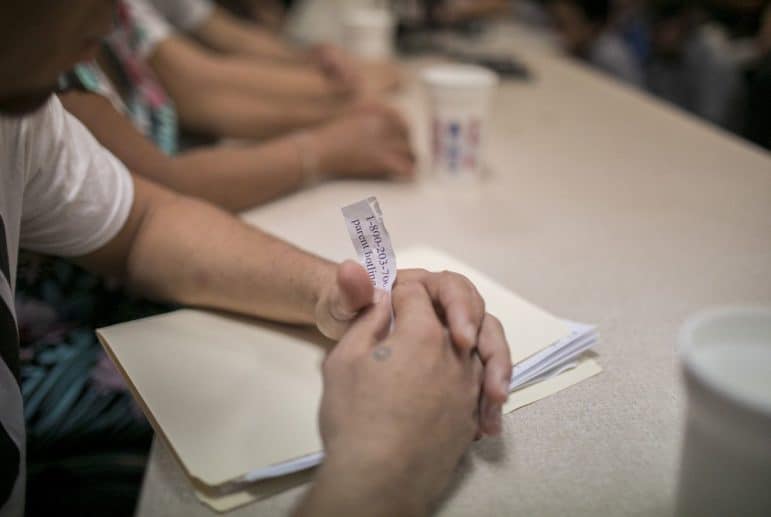
Ivan Pierre Aguirre / for The Texas Tribune
Mario, who did not want to release his last name, holds the number to the hotline parents are suppose to call to try to find their children during a press conference at the Casa Vides Annunciation House immigrant shelter on June 25 in El Paso.
With just days to go before a court-mandated Tuesday deadline to reunite parents with children under 5 who were taken from them at the border, the federal government says it needs more time.
In a court filing late Thursday, federal lawyers said the government might have to miss the deadline in cases where parents have been paroled or otherwise released into the interior of the United States as opposed to remaining in immigration detention facilities. Reuniting will also take more time in cases where officials aren’t able to confirm parentage using DNA cheek swabs.
It will also be difficult to reunite toddlers with parents who may have already been deported “given the complexities involved in locating individuals who have been removed, determining whether they wish to be reunified with their child, and facilitating such a reunification outside of the United States,” government attorneys wrote.
That likely means not all of the 100 or so children under 5 will be reunited with their parents by the Tuesday deadline set last week by a federal judge in California.
Federal officials have until July 26 to bring together families with older children.
“[The U.S. Department Health and Human Services] has worked diligently to expedite these processes to enable the Government to comply with the timelines in the Court’s order,” lawyers for the federal government wrote Thursday. “HHS anticipates, however, in some instances it will not be able to complete the additional processes within the timelines the Court prescribed.”
A status conference on the case is scheduled for later Friday in San Diego.
The filing came Thursday hours after HHS Secretary Alex Azar told reporters that the government would meet its court-ordered deadline, even if doing so meant lowering standards for verifying parents’ identities and criminal backgrounds.
“We will comply with the artificial deadlines created by the court — deadlines that were not informed by the process needed to vet parents, including confirming parentage as well as determining the suitability of placement with that parent,” Azar said. “We will comply, even if those deadlines prevent us from conducting a standard or even a truncated vetting process.”
He also said Thursday that his agency would “inform the court of what we believe to be in the best interest of child welfare and seek additional time to ensure that we can do the job that we believe is necessary.”
